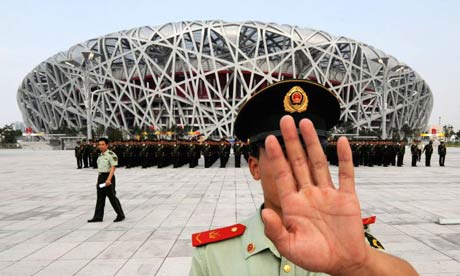China not only censors Internet, but also hires agents peddling government views online
Posted by Author on April 8, 2010
Michael Wines, Sharon LaFraniere and Jonathan Ansfield and written by Mr. Wines, New York Times, Apr. 8, 2010-
BEIJING — Type the Chinese characters for “carrot” into Google’s search engine here in mainland China, and you will be rewarded not with a list of Internet links, but a blank screen.
Don’t blame Google, however. The fault lies with China’s censors — who are increasingly a model for countries around the world that want to control an unrestricted Internet.
Since late March, when Google moved its search operations out of mainland China to Hong Kong, each response to a Chinese citizen’s search request has been met at the border by government computers, programmed to censor any forbidden information Google might turn up.
“Carrot” — in Mandarin, huluobo — may seem innocuous enough. But it contains the same Chinese character as the surname of President Hu Jintao. And the computers, long programmed to intercept Chinese-language searches on the nation’s leaders, substitute an error message for the search result before it can sneak onto a mainland computer.
This is China’s censorship machine, part George Orwell, part Rube Goldberg: an information sieve of staggering breadth and fineness, yet full of holes; run by banks of advanced computers, but also by thousands of Communist Party drudges; highly sophisticated in some ways, remarkably crude in others.
The one constant is its growing importance. Censorship used to be the sleepy province of the Communist Party’s central propaganda department, whose main task was to tell editors what and what not to print or broadcast. In the new networked China, censorship is a major growth industry, overseen — and fought over — by no fewer than 14 government ministries.
“Press control has really moved to the center of the agenda,” said David Bandurski, an analyst at the China Media Project of the University of Hong Kong. “The Internet is the decisive factor there. It’s the medium that is changing the game in press control, and the party leaders know this.”
Today, China censors everything from the traditional print press to domestic and foreign Internet sites; from cellphone text messages to social networking services; from online chat rooms to blogs, films and e-mail. It even censors online games.
That’s not all. Not content merely to block dissonant views, the government increasingly employs agents to peddle its views online, in the guise of impartial bloggers and chat-room denizens. And increasingly, it is backing state-friendly clones of Twitter, Facebook and YouTube, all Western sites that have been blocked here for roughly a year.
The government’s strategy, according to Mr. Bandurski and others, is not just to block unflattering messages, but to overwhelm them with its own positive spin and rebuttals. …… (more details from New York Times)
Rate this:
Share this:
- Click to email a link to a friend (Opens in new window)
- Click to share on Twitter (Opens in new window)
- Click to share on Facebook (Opens in new window)
- Click to share on Tumblr (Opens in new window)
- Click to share on Pinterest (Opens in new window)
- Click to share on Reddit (Opens in new window)
- Click to share on LinkedIn (Opens in new window)
- Click to print (Opens in new window)
Related
This entry was posted on April 8, 2010 at 8:35 pm and is filed under censorship, China, Freedom of Information, Freedom of Speech, Human Rights, Media, News, Politics, Social, World. You can follow any responses to this entry through the RSS 2.0 feed. Both comments and pings are currently closed.
Sorry, the comment form is closed at this time.





